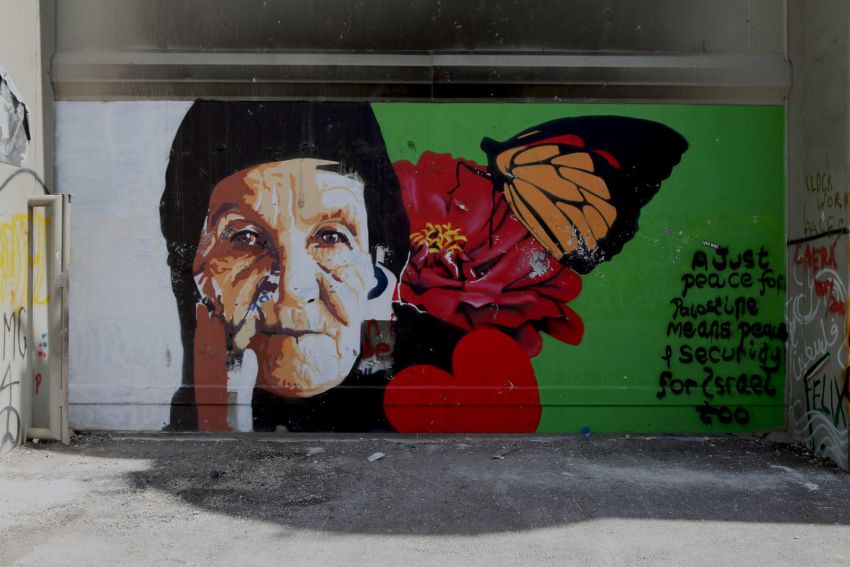
Israel’s latest onslaught on the Palestinian people killed at least 250 people, including 66 children, injured nearly 2000 and displaced 74,000 people.
If that wasn’t enough, more than 44 Palestinian cultural institutions were partially or completely destroyed by the attacks.
Since 1948, Israel has targeted Palestinian arts and cultural centres in an attempt to stifle Palestinian culture and expression. For example, in 2018, the Said al-Mishal Centre (a five-story complex for dance, music and theatre) was razed, and the Arts and Crafts Village in Gaza was all but destroyed.
Included in this year’s cultural targets was the Dar Yusuf Nasri Jacir for Art and Research, an arts centre in Bethlehem that was raided and ransacked. Israeli forces stole phones, computer hard drives, cameras and books.
The Samir Mansour Library, a popular and historic bookstore and publishing house was also bombed and destroyed.
As Tahseen Alyan, a researcher at the Al-Haq rights organisation in the West Bank pointed out, “the attack on cultural institutions is also in violation of Article 53 of the First Protocol of the Fourth Geneva Convention, providing for the protection of cultural spaces, and places of worship and historical monuments, ‘which constitute the cultural and spiritual heritage of peoples.’”
One small way we can express solidarity with Palestinian artists, writers and musicians is by learning about their work and sharing it with others.
The following poems by Palestinian poet Maya Abu-Alhayyat, translated by Fady Joudah, were first published in the Los Angeles Review of Books on May 14.
♦ ♦ ♦
We
Yes, we
who raise our flags on every occasion,
mention Palestine twenty times in a sentence,
afraid to laugh for too long,
guilty over our fleeting small joys,
we the pursued
over our identities,
our places of birth,
and especially our burial lots,
we, kind and wicked,
heroic and obstinate,
the first to die and, if necessary, the last,
we nationalists, sentimentalists, tearful,
always tearful
over children we don’t know
who pass by us
with or without sending smiles our way,
their many questions and infuriating habits.
We showed our hand too soon,
our weeping over adolescents
who peacefully stand in front of their houses
making gestures, playing
the game of men,
and our weeping over mothers, all of them,
the happy ones with news of pregnancy,
and those who dispatch letters to TV
and radio stations, oh mothers
who send winter clothes one size too big
to their incarcerated sons,
yes mothers
who regurgitate their sorrows and mottos
as stories regurgitate us,
year after year,
we cry and cry
until we cry no more
and stop joking around.
We showed our hand too soon,
we know who we are.
Massacres
Massacres teach me not to wait
for those who’ll be pulled out of the rubble,
and not to follow the stories of survivors.
I go on with my day without pausing for wonders.
I’ve learned how friends forget me
and, if I’m lucky, my enemies as well.
Callously I pass through memories.
Love on the faces
of adolescent girls also passes,
makeup and sorrow eat it.
And the orphanage within the suitcases of orphans
is tossed by slogans to the rubbish bins of poetry.
Nothing’s forever.
Not success or laziness,
not dithering or labor,
even dazzling verse
grows onerous,
and to stumble or shatter
is sometimes beautiful.
A little bit of weight gain,
a fainting glimmer in the eyes,
some friends who evade or desire you,
there’s not much more to learn.
I keep running in empty rooms
to begin my day as if yesterday didn’t end
and tomorrow won’t come.
And before I cast my curses
on those who persevere in loneliness
and hesitate to return my greetings,
I remember how often in the chill
we leave tender skin
bloodied, alien, and dry.
I Don’t Ask Anymore
How many kids you have,
where you live
or what your profession is:
I don’t care. Maybe I care
how you spend your day
or pass the long nights in anguish,
how you treat your chronic illness,
seasonal allergies, swellings,
your method with longing,
how you avoid toxic videos
and never stop on the street
when everyone else stops.
Tell me how you crossed the street
after you were released
from long detention —
it matters to me
what you’re thinking now
as you coerce your kids to sleep
in the middle of shelling,
as you sweep off them
the ghost of death in nightmares.
I don’t ask anymore
about your land or religion,
maybe I care
how you were tortured
in the first or second intifada
and other wars. How you took care
of your pills and fears,
escaped destiny by chance,
through teargas,
incursions,
and the tank in the city square.
Your name, your age,
what you look like don’t matter.
You passed through here
like a miracle.